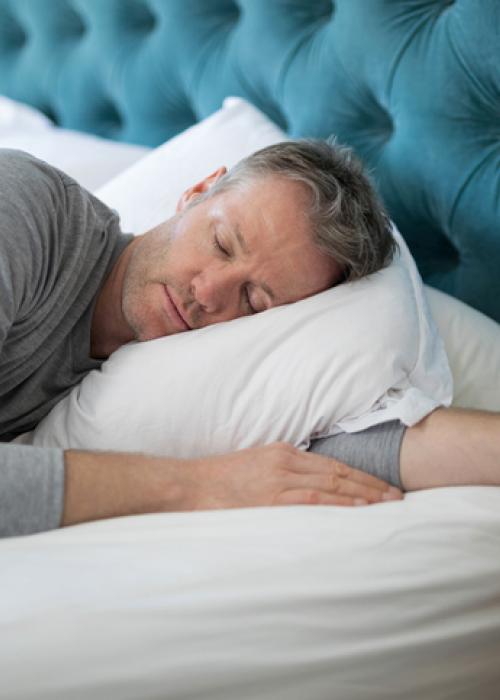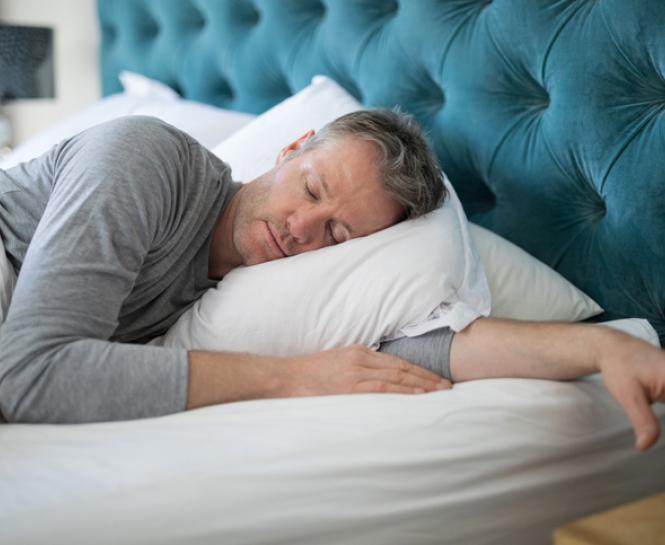The holiday season is supposed to be an enjoyable time with family and loved ones, but it can also be stressful. A bustle of activities—shopping for gifts, decorating, school and work activities, traveling and visiting loved ones—can make it easy to overlook important health habits like a healthy diet, exercising and sleeping.
Why is sleep so important during the holidays?
“The holidays frequently introduce factors such as late-night gatherings, travel, and changes in meal patterns, which can interfere with both the timing and quality of our sleep,” said David Warkentin, System Director of Catholic Health’s Sleep Service.
He explained that maintaining a consistent sleep routine is crucial, even during holiday chaos. For example, one night of poor sleep can reduce the strength of your immune system and make catching a cold or the flu easier.
On average, adults need between seven and nine hours of sleep. However, family gatherings, office parties, and holiday shopping can disrupt our sleep-wake cycles by keeping us up later than usual.
He recommends the following tips to ensure you get enough sleep and to help create a relaxing bedtime routine during the holiday season.
Tip 1: Eat and drink in moderation
“We tend to overindulge during the holidays,” said Mr. Warkentin. “We eat heavy meals, drink alcoholic beverages, and consume sweets— all of which can contribute to poor sleep.”
Time your meals. Eating earlier in the evening gives your body time to digest before bedtime.
Avoid or limit heavy or spicy meals. They may cause an upset stomach and heartburn, making falling and staying asleep difficult.
Limit alcohol consumption. Alcohol negatively affects sleep and obstructive sleep apnea (OSA) by reducing deeper levels of sleep and causing increased awakenings due to dehydration. It relaxes the upper airway muscles, exacerbating snoring and apnea, particularly in those with existing OSA. While it may help some people fall asleep initially, its overall impact leads to poorer sleep quality and greater complications for those with sleep apnea.
Tip 2: Stay active
Exercise significantly enhances sleep by promoting faster sleep onset and improving sleep quality, particularly by increasing deep sleep, which is vital for recovery. It reduces stress and anxiety by releasing endorphins, helping to calm the mind. Regular physical activity helps regulate circadian rhythms, making it easier to maintain a consistent sleep-wake schedule and combat insomnia.
While exercise boosts daytime energy levels, it is generally best to do it earlier in the day or a few hours before bedtime to avoid potential sleep interference.
Tip 3: Create a comfortable sleeping environment
Mr. Warkentin explained that it can be harder to fall asleep and stay asleep when we are not in our familiar environment at bedtime, whether at a loved one's home or a hotel. It is commonly known as the “first-night effect.”
He recommends the following to practice good sleep hygiene:
Lower the room’s temperature. A cooler bedroom temperature helps lower the body’s core temperature, which is necessary for falling asleep and achieving deeper sleep stages. Research has shown that a temperature between 60-67 degrees Fahrenheit will lead to optimal sleep.
Keep a journal. Jotting down your thoughts will help center you. You can share what is worrying you. Reduced stress makes it easier to fall asleep. Also, share what you are grateful for to give yourself something positive to focus on.
Practice slow and deliberate breathing. Use the 4-7-8 rule: Breathe slowly for four seconds, hold it for seven seconds, and then breathe slowly for eight seconds. Similar to journaling, focusing on your breathing helps to calm your mind and reduce intrusive thoughts that keep you from falling asleep.
Avoid electronics. Turn off the TV. Do not use a cell phone or laptop to play games or scroll through social media. Studies have shown that the blue light from electronic devices limits melatonin production. Our brains are frequently overstimulated—unplug and get some rest.
Keep the lights off. A dark sleeping environment supports the body's natural circadian rhythms, helping to maintain a consistent sleep schedule and improving overall sleep quality.
Drink tart cherry juice. Drinking tart cherry juice before bedtime can have beneficial effects on sleep. It is a natural source of melatonin, which helps regulate sleep-wake cycles and may improve sleep duration and quality.
Tip 4: Create a travel plan
“Travel disrupts our normal sleep patterns,” said Mr. Warkentin. “Making a travel plan can help you follow your normal sleep schedule.”
Air travel. If traveling to a different time zone, prepare yourself for jet lag, which disrupts your circadian rhythm (internal body clock). Take about one day for each time zone crossed to re-establish a circadian rhythm. Staying up longer is easier than going to bed early, so it takes less time to recover from traveling west than from traveling east.
Driving. Avoid driving if you feel sleepy and drowsy. Our reflexes are slower when tired. You can also unintentionally fall asleep at the wheel.
Make your sleeping space like home. Bring familiar items such as a pillow, blanket and white noise machine. Spraying lavender essential oil can help calm your mind. If you have obstructive sleep apnea, bring your CPAP device with you.
Tip 5: Avoid long naps
“Taking a nap after a meal, between shopping or parties, can be tempting, especially if you did not get a good night’s sleep the day before,” said Mr. Warkentin. “But napping too long will make it harder to fall asleep at night and will disrupt our regular sleeping patterns.” He recommends napping earlier in the day and keeping the naps between 20-45 minutes.
He noted that napping should be strategically used to help counter excessive daytime sleepiness and that it should not exceed 90 minutes.
The Napachino. A "napachino" strategy combines a short nap with caffeine consumption. The idea is to drink a small amount of coffee (or another caffeinated beverage) right before taking a brief nap, typically around 20 minutes. It works on the premise that caffeine takes about 20 minutes to start affecting the body, so when you wake up from your nap, the caffeine kicks in, helping to boost alertness and energy levels. This method can be effective for those looking to refresh themselves quickly while minimizing the grogginess that sometimes follows longer naps.
Do not try this strategy if you have a health condition that is affected by caffeine consumption.
Tip 6: Talk to a board-certified sleep specialist
If you have a history of sleep problems, especially a sleep disorder like insomnia, talk to a board-certified sleep specialist before the holiday season begins. Together, you can plan to enjoy the holidays without losing sleep.
View Catholic Health sleep services.







